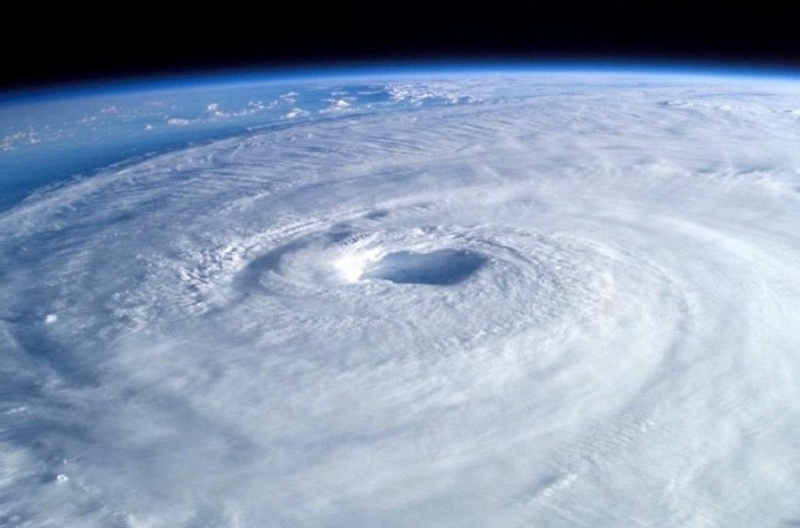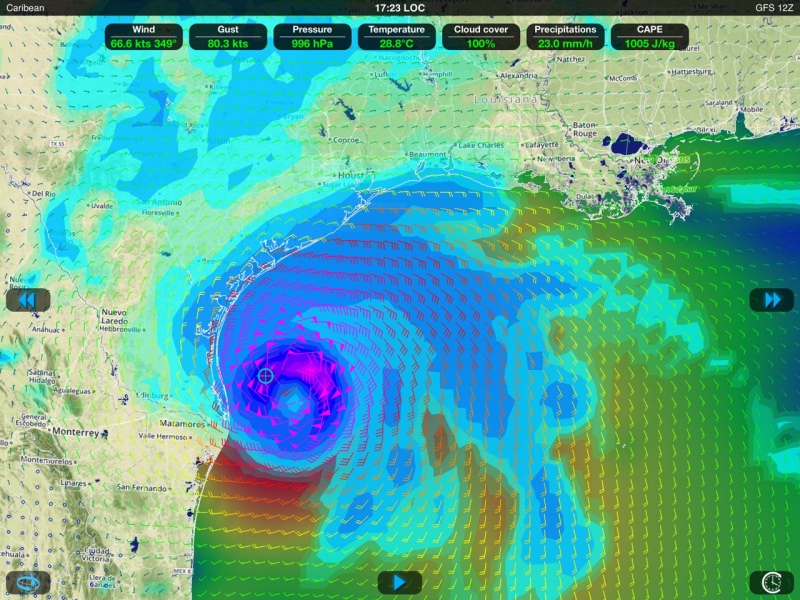In full political news on global climate change, the terrible Hurricane Harvey questioned some scientists about the link between warming due to human activities and intense weather events increasing in recent years.

Source : National Weather Service
Michael E. Mann, distinguished professor of atmospheric science at Pennsylvania State University, director of the Penn State Earth System Science Center and author of three books, including The Hockey Stick and The Climate Wars, Dire Predictions, and The Madhouse Effect, develops a long commentary in theguardian.com (¹) about it, freely translated by myself.
What can we say about the role of climate change in the unprecedented disaster unfolding in Houston with Hurricane Harvey ? There are some factors related to climate change that we can, with a great confidence, say worsened the flooding.
Sea level rise attributable to climate change – some of which is due to coastal subsidence caused by human disturbance such as oil drilling – is half a foot (15 cm wide) over the past decades. That means the storm surge was half a foot higher than it would have been just decades ago, which means a lot more flooding and destruction.
On top of that, sea surface temperatures in the region have risen about 0.5°C over the past few decades from roughly 30°C at 30.5°C, which contributed to the very warm sea surface temperatures (30,5-31°C).
There is a simple thermodynamic relationship known as the Clausius-Clapeyron equation that tells us there is a roughly 3% of the average atmospheric moisture content for each 0.5°C of warming. Sea surface temperatures in the area where Harvey intensified were 0.5-1°C warmer than current-day average temperatures, which translates into "average" temperatures of 1° to 5° warmer than a few decades earlier. This means 3 down to 5% more moisture in the atmosphere.
That large amount of moisture creates the potential for much greater rainfalls and greater flooding. The combination of coastal flooding and heavy rainfall is responsible for the devastating flooding that Houston is experiencing.
Not only are the surface waters of the Gulf of Mexico unusually warm right now, but there is a deep layer of warm water that Harvey was able to feed upon when it intensified at near record pace as it neared the coast. Human-caused warming is penetrating down into the ocean. It’s creating deeper layers of warm water in the Gulf and elsewhere.
Harvey was almost certainly more intense than it would have been in the absence of human-caused warming, which means stronger winds, more wind damage and a larger storm surge. (As an example of how it works, we have shown that climate change has led to a dramatic increase in the risk of storm surges in New York City, making devastating events like Hurricane Sandy more likely).
Finally, the more tenuous but potentially relevant climate factors : part of what has made Harvey such a devastating storm is the way it has stalled near the coast. It continues to pummel Houston and surrounding regions with a seemingly endless deluge, which will likely top out at nearly 1.20 m. of rainfall over a days-long period before it is done.
The stalling is due to very weak prevailing winds, which are failing to steer the storm off to sea, allowing it to spin around and wobble back and forth. This pattern, in turn, is associated with a greatly expanded subtropical high pressure system over much of the US at the moment, with the jet stream pushed well to the north. This pattern of subtropical expansion is predicted in model simulations of human-caused climate change.
More tenuous, but possibly relevant still, is the fact that very persistent, almost "stationary" of this type, where weather anomalies (both high-pressure dry hot regions and low-pressure stormy/rainy regions) stay locked in place for many days at a time, appears to be favoured by human-caused climate change. We recently published a paper in the academic journal Scientific Reports on this phenomenon.
In conclusion, while we cannot say that climate change "caused" Hurricane Harvey (that is an ill-posed question), we can say is that it exacerbated several characteristics of the storm in a way that greatly increased the risk of damage and loss of life. Climate change worsened the impact of Hurricane Harvey.
–––
(¹) Source : The Guardian
–––



This shows once again that the US president has indeed "Trumped" himself by leaving the Paris agreements.